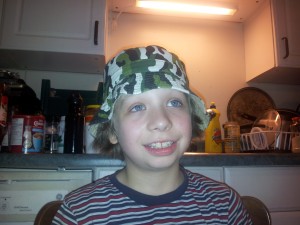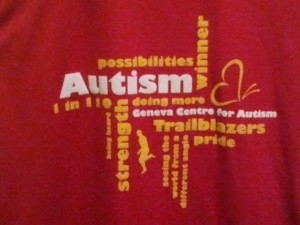A few short weeks from now, my older son George will be turning 10. This is a pretty big milestone for any parent. Not only will it launch George into double digits, it will mean that I have navigated the mysterious world of parenting for a full decade. Not just any old parenting, either – special needs parenting.
In his ten years, George has accomplished some amazing things in the face of his autism. I could go on all day about progress and milestones and potential, and I really am proud of his determination. Whether or not he is aware of his disability is debatable, but either way, he works really hard for every single victory. The smallest accomplishments that would go unnoticed in most families are a giant cause for celebration in ours.
The harsh reality, though, is that George still has some challenges, the most obvious of which is his lack of speech. He can talk – he has the physical ability and the vocabulary – but he doesn’t. His speech is mostly limited to requests, although he does occasionally make mind-blowing (to me) statements, like last week when he showed me his “screaming green angry gorilla”, which was actually a Hulk toy.
We cannot have conversations with George. We cannot say, “So, what did you do at school today?” and expect him to answer. His standard answer to most questions that are posed to him is “yes”, even when that doesn’t fit the question. Of great concern to me, if something bad was happening to him, like bullying or molestation, he wouldn’t be able to tell me about it.
That’s just the speech side of it. Social communication is an issue big enough for its own blog post. And as much as George has made phenomenal cognitive gains, in many areas he still functions well below the level of typical kids his age.
And so, with his 10th birthday approaching, my husband and I are preparing ourselves for the fact that he may not be as high-functioning a teenager as we have been hoping. When we got his report card a couple of weeks ago – the one that says he is “transferred” to Grade 5, unlike other kids who are “promoted” – I had a moment of pure terror at the realization that 8 years from now, he will be nominally eligible to graduate high school. It wasn’t the normal “Oh, how fast time passes” kind of terror. It was fear for George’s future.
Until now, my husband and I have been swirling these thoughts around in our heads, but today we spoke about them for the first time. We talked about preparations that need to be made and programs that need to be sought out. We talked about what the reality of life is likely to be when George reaches teenagerdom, just three years from now. He will not have a peer support system like most kids, and he will always be quite obviously “different”. He will go through the angst of adolescence without the ability to express himself verbally, and if we don’t keep a close watch on him, he might be the target of bullying. Other teens – or, Lord help us, some adults – might take advantage of his natural sweetness and trusting nature.
Talking about it makes it so much more real and so much scarier. It brings tears close to the surface and makes me feel very emotional. It makes me wonder if I, as George’s mother, have been doing enough for him. Is there something I have overlooked, some possibility that I have not explored, some avenue of opportunity that I have allowed to pass by?
Of course, I could be wrong. We could see George’s speech and social communication skills explode one day. I am not giving up, and I am not losing hope. I am simply being realistic so I can equip myself to provide the kind of support George will need as he navigates his way from here to adulthood.
Today, when I was out for a walk with my family, I kept looking over at George with an aching heart. He is my beautiful boy, with the most tender of souls, and I just want for him to be OK.
(This is an original post by Kirsten Doyle. Photo credit to the author.)











